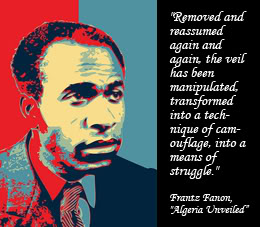
I attended a lecture on the legacy of Frantz Fanon’s humanism last night, presented by Bengali historian Dipesh Chakrabarkty. So uplifting was it that I didn’t even feel the winter cold when I sped home glove-less on my bicycle after the lecture.
In a general sense Dipesh made a case for the importance of Fanon’s utopianism and the relevance of such (anti-colonial) poetics in our efforts to resolve the cross tension between the forces (and discourses) of globalization and global warming in order to address the challenge of the latter.
He characterizes this cross tension as one between respective emphases on ‘difference’ and the ‘particular’ on the one hand, and the ‘universal’ or ‘general’ on the other. In some ways, he suggests, certain forces of globalization cause and/or intensify global warming. Yet, ‘we’ cannot effectively address global warming without somehow drawing on certain (other?) global forces.
If we allow debates to be dominated by globalization discourse(s) ‘we’ act as particulars differentiated by a history of ‘what has already been’. If we were to follow these lines, he suggests, then China and India for instance, have every right to their claims that ‘it is their time to pollute’ seeing as other nations have enjoyed doing so for thus long already etc etc. Such an approach would never breach the gap between ‘what we know ought to happen’, and ‘what actually happens’.
Rather, what we need are accounts of history like Fanon’s utopian anti-colonialism. We need a ‘new myth’ in order to think of the history that could have happened but did not, what could have been, but was not.
Chakrabarty also discussed at length the way Fanon envisioned the relationship between difference and the particular and the general or universal in his humanist theory, noting that he rejected ‘going back’ to some ‘essence’ or ‘root’ of difference (which the Negritude movement proposed at the time) as well as rejecting the idea Imperialist or universalist forms of humanism that required all people approach the universal.
Fanon, he suggests, had an alternate vision that recognized and appreciated difference in humanism in a program for violence that erupts from within. The contingencies of history will not simply ‘emerge’ into ‘what ought to happen’, nor will history just naturally transcend difference and ‘work things out’ in this way. In order to breach this divide – between what ought to happen and what actually happens, Fanon argues, there has to be a violent will; people must break out of their bodies and erupt into the universal – into what ought to happen based not on what has already happened, but what could and should have happened, but did not.
One of the first questions put to Chakrabarty was whether Fanon’s was not an argument for revolution over reformism. Despite this being the obvious interpretation Dipesh preferred to focus on the poetics and philosophy deemphasizing the politics. Fair enough I suppose. It was an impressive and enjoyable talk that surely energized most in the audience.
I was difficult not to share his enthusiasm to ‘mobilise what ought to happen’ by re-visiting the poetic utopianism of anti-colonial thinking. I particularly enjoyed his comment on ‘realists’ – and the fact that it is ‘hard to distinguish between ‘strategic’ or ‘practical’ thinking and ‘bad faith.’ I think this alone is a wonderful argument for the importance of utopian thought.


Yes good but spelling…we are act third
I just read a perhaps less subtle expression of Fanon’s desire for/to ‘violent will’ – “Fuck public opinion, lets explode!”
“Usurp the future!” is another nice one I just read.